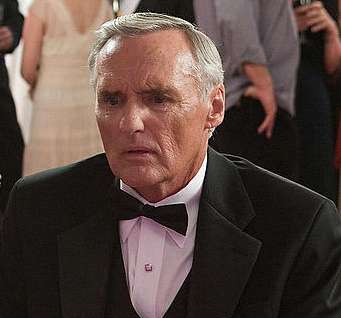Incredibly Bad Film Show: Swing Vote
Dir: Joshua Michael Stern
Star: Kevin Costner, Madeline Carroll, Paula Patton, Dennis Hopper

What makes Swing Vote an Incredibly Bad Film is not the acting – no film with Mare Winningham in it will ever get less than glowing reviews in that area from us. No, it’s a story which combines relentless implausibility and extremely dubious morality, that had me wanting to assemble a mob with torches and storm the home of writers Stern and Jason Richman – just as soon as I finish vomiting at the heartfelt sincerity of it all.
The ‘hero’ – quotes used advisedly – is Bud Johnson (Costner), an alcoholic layabout who just got fired from his job at an egg-packing plant, and who barely functions on any level above survival. He relies mostly on the needling of precocious moppet Molly (Carroll) to get him through the day. She is the brightest in her class and wants to grow up to a vet “or chairman of the Fed.” Never mind the fact that given her parents and environment, she’s a more plausible candidate for an “I’m twelve and pregnant” edition of The Jerry Springer Show. Election day rolls around, and Molly convinces Bud to do his civic duty and vote. He instead, gets drunk and falls asleep, so Molly decides to exercise her father’s democratic right and vote for him.
It’s a massive burst of hypocrisy right there: why would someone so intelligent, yet clearly smitten with the divinity of the electoral process, choose to commit voter fraud? There’s another hole in the film’s philosophy too: while it may be a duty to vote. it’s not an obligation. If you choose not to vote, that’s perfectly fine too; if you’d rather collapse into alcoholic unconsciousness, that is absolutely your right. Go for it. Frankly, it would probably be best for the country if people like Bud are kept out of the process: what we see here is electoral evolution in action. The fewer dumb people that get to vote, the greater weight given to the ballots of those capable of completing the apparently-complex task.
Anyway, back in the polling station, the worker on duty, guarding the previous flame of democratic freedom has, conveniently fallen asleep, allowing Molly to swipe a ballot and enter the booth. In another remarkable coincidence, a rogue vacuum-cleaner knocks out the plug to the voting machine in the middle of the process. A startled Molly pauses only long enough to tear carefully the stub from the ballot, before escaping, her father’s vote now lost in electronic limbo [that sound you hear is the British electoral system sniggering, as we still use the sturdy “X on the ballot paper” method].

Naturally, in a third strike which doesn’t so much require the suspension of disbelief, as its garroting with piano-wire, that vote turns out to be the deciding one in the deciding count in the deciding state, and because Johnson was ‘robbed’ of his vote, he is given another chance. In ten days, he’ll get to cast the deciding vote. In the meantime, of course, both the Republican and Democratic contenders (Kelsey Grammer and Hopper) are falling over themselves to court Bud. I’ll pause for a moment to enjoy the irony of one of actor behind one of the most iconic rebel performances of all time in Easy Rider (or even Blue Velvet), now playing an establishment lackey.
From here, the film should have gone for dark satire – how far are the parties prepared to prostitute themselves for one man, especially a smart one who knows how to manipulate them? And there are moments when the film does take that route, most notably a lovely ad with the Democrat going pro-life in a playground of exploding kids. It would then have concluded with Bud deciding neither candidate was worthy of his vote – or even more subversively, casting his vote for a candidate outside the two-party system. This alone is something the film steadfastly refuses to acknowledge, even though almost 1.7 million voters selected someone outside the Rep-Dem duopoly in the 2008 election.
Instead, it goes for the sentimental jugular, with Bud undergoing a crash course in everything he needs to know, the night before he hosts a presidential debate. This allows him to deliver, at great length, the sort of heartfelt nonsense he must have insisted on plugging into the script [he helped bankroll this production], in the belief he was still playing Ray Kinsella, rather than a piece of alcoholic trailer-trash who can’t string ten words together. It feels almost as out of place as the turd-shaped musical number Kevin Bud drops in the middle of a political banquet, though allows him to regain the respect of his daughter. Where the hell are Child Protective Services in all this?

The film is nothing if not neutral, even-handedly portraying Democrats and Republicans. In the hands of Stern, this comes across more as bland, commercial-minded cowardice than anything – oh my goodness, let’s not say anything which might potentially offend either side of the cinema-going audience [showing remarkable good taste, the public voted with their wallets, and Swing Vote failed to crack the top five, even on its opening weekend, earning a paltry worldwide total of $17.6m]. Both parties are shown as honest, compassionate politicians who just go a little overboard in their pursuit of victory – let’s hear it for completely toothless satire (Jonathan Swift is spinning in his grave like a Vegas slot-machine reel). At the end, we don’t even find out who Bud picks: for a film all about the importance of exercising your right to choose, this is a complete cop-out.
To summarize, we have a film which glorifies the kind of man most of us would actively cross the street to avoid, proclaims that defrauding the electoral process is noble, condones the media’s collusion in the fraud – a local TV journalist (Patton) discovers what’s going on, but opts to stay silent – and emphasizes the abject failure of democracy in America. The concept that every vote counts is a laudable one, though strained somewhat, say, here in Arizona, which has been Republican every Presidential election bar one for the past sixty years. However, when the vote that really counts belongs to a supposed “everyman” like Bud, it makes me want to break out into a rousing chorus of Tomorrow Belongs to Me.
D-